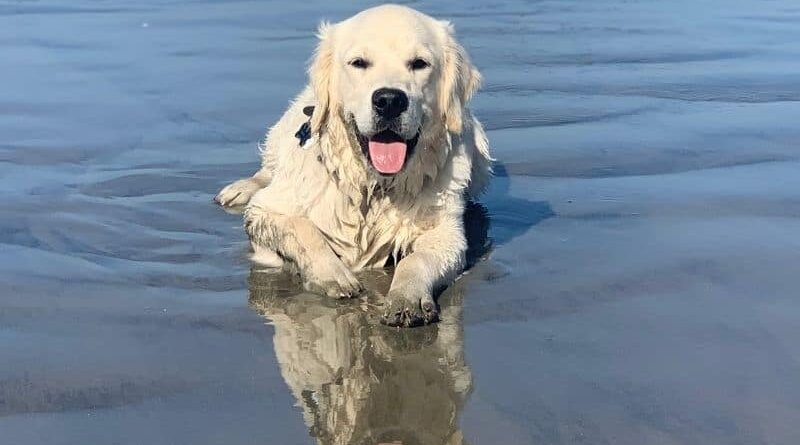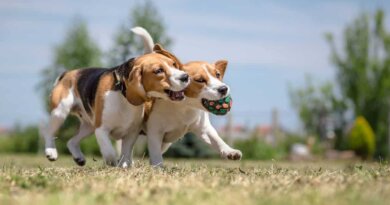Why Does My Golden Retriever Pant So Much?
This post may contain affiliate links. We may earn money or products from the companies mentioned in this post.
Have you noticed that your golden retriever pants more frequently than other dog breeds?
Dogs normally pant to regulate their body temperature, but you may be wondering why your dog seems to pant so much more.
Can you blame it on this breed’s exuberant personality and heavy coat?
Your golden retriever’s thick, lustrous coat does store more heat, especially when your dog has been highly active.
This results in your dog panting more when they need to cool down. But how do you know if your dog’s panting behavior is normal or excessive?
Furthermore, when should you get concerned?
Knowing what to look out for when your dog pants more frequently can help you determine if something isn’t right with their health.
Keep reading as I talk about golden retriever panting, when it’s normal or abnormal, and how to manage it when it seems excessive.
Why Is My Golden Retriever Panting?
All dogs pant to cool down, with some breeds doing it more frequently than others.
Dogs with short snouts such as bulldogs and pugs tend to pant heavily and more often.
Breeds with dense fur like your golden will also pant more to stay cool, even during winter.
Unlike their human owners who sweat through their skin to cool down, dogs pant to release excess body heat through their mouths.
However, not all breeds pant as much as golden retrievers, who sometimes even have their whole tongue hanging out, drooling while panting!
This leads to another question often asked by golden owners: why do golden retrievers drool excessively when panting?
The answer to this is normally that your dog is overheating and needs to cool down quickly, which this messy behavior helps them to do.
Panting in dogs is normal behavior for another good reason besides cooling down and regulating body temperature.
It also helps to draw more oxygen into the bloodstream when your dog pants with their mouth open.
In most cases, panting and drooling are normal behaviors for your golden retriever.
However, what is considered normal or abnormal panting and when should you get concerned?
Our breeds of choice are obviously Golden Retrievers, Labrador Retrievers, Poodles, Doodles, German Shepherds, and Australian Shepherds.
I can tell you based on our experiences our Goldens do in fact pant the most between the breeds we’ve worked closely with.
Right now we have a Golden Retriever, Raven, Black Lab, Elsa, and a Golden Lab Cross, Anna. Raven by far pants more than the other two.
Golden Retriever Panting: When Is It Normal Behavior?
Recognizing when your golden is panting normally or abnormally is key to assessing your dog’s overall wellbeing.
As I touched on earlier, in general, panting isn’t always a cause for concern.
The following circumstances normally cause your golden pooch to pant more than usual.
Overheating
With its beautiful, long, heavy coat, your dog will naturally store more heat when the outside or indoor temperature is high.
This could result in overheating, and your goldie will pant more (and drool) to cool down quickly.
Exercise
Golden retrievers love to be physical, and the more exercise they do, the more frequently they’ll pant to regulate their body temperature while cooling down.
In most cases, heavy panting is a natural response to intense physical training and activity.
Excitement
Goldies are naturally excitable dogs, resulting in a faster heart rate, which increases the need for more oxygen to the bloodstream.
This makes your four-legged friend pant more while keeping their blood oxygenated when overly excited.
Golden Retriever Panting: When Is It Abnormal Behavior?
There are also a number of more concerning reasons why your golden could be panting more than normal. In these cases, you’ll need to take your dog to the vet for a check-up.
Anxiety And Fear
If your golden retriever is stressed, fearful, or anxious, they will pant excessively. Stressors could include any of the following:
- Separation anxiety
- Fireworks or other loud noises
- Visits to the vet
Anxiety and fear trigger a fight or flight response, which releases a number of stress hormones in your dog’s body.
This results in various physiological responses such as a rapid heart rate, higher body temperature, heightened senses, and increased panting or breathing.
If your goldie is prone to stress or anxiety, you can expect their panting behavior to become abnormal when they’re feeling frightened.
Scared dogs pant to cool and calm themselves down while bringing their body back to a normal state.
Other signs of dog anxiety include drooling, urinating or defecating in the house, and pacing or restlessness.
Learn more about how you can handle separation anxiety when you leave your Golden home alone.
Our Golden Retriever, Raven is very sensitive to noise especially fireworks and thunder. When she hears these sounds the fear and anxiety kick in and she starts panting.
Pain Caused By Injuries Or Illnesses
Dogs are very adept at hiding pain. It’s a natural survival response to keeping themselves safe in dangerous situations should they be living in the wild.
However, your domesticated golden retriever may start to pant more frequently because of pain caused by an injury or illness.
If you notice any of the other signs accompanying abnormal panting, your dog could be in pain:
- Decreased appetite
- Lethargy and no interest in activities
- Decreased mobility
- Whining or moaning
- Changes in behavior such as snapping or growling
Limping, vomiting, and diarrhea are other symptoms that could indicate your dog is battling pain and is feeling traumatized.
Obesity
Overweight pet dogs are common, with obesity in golden retrievers being a problem for many dog owners.
If your dog is overweight, they’re carrying more fat, which means more layers of insulation on their body to keep warm. However, this also increases their panting rate!
What’s more, an obese dog puts more strain on their joints which, in turn, creates pain in the body and, yes, more panting in response!
Being overweight also makes activities more strenuous for your dog, resulting in more frequent panting.
Obesity can give rise to other medical conditions such as heart disease that contribute to abnormal panting.
Managing your dog’s weight is essential if you want to avoid further health complications.
Unfortunately, I have to admit our black Lab, Stetson was obese and tended to pant more as he got older and heavier. We put him on a diet and exercise program to try and control his weight.
As your dog slows down you need to watch their weight, exercise your dog regularly and monitor the amount of food and treats you are giving.
Allergies
If your golden retriever often goes for walks in the local doggie park or spends time playing games in your garden, they could be exposed to environmental allergens.
These include dust, mold, and pollen, which are seasonal but can cause your dog to have uncomfortable symptoms.
Food allergens can also cause itchy skin or unpleasant gastrointestinal problems, while bee stings and vaccines can lead to severe allergic reactions.
While increased panting could be one symptom of dog allergies, others include the following:
- Itchiness and excessive scratching or rubbing
- Hives and swelling of body areas such as the face
- Sneezing or coughing
- Chronic ear or eye infections
- Constant licking
All of the above-mentioned symptoms are enough to make your dog pant more frequently.
Medical Conditions
A number of medical conditions could be triggering your golden retriever’s panting.
Heart disease in dogs, for example, often results in less oxygen getting around the body, while the same happens with respiratory issues such as pneumonia.
Cancerous growths or fluid build-up in the lungs can also result in your goldie panting more than usual.
Alternatively, if your golden retriever eats too fast or exercises immediately after having a meal, they may experience bloat, which causes the stomach to distend abnormally.
This life-threatening condition results in your dog panting excessively due to the pain of its stomach twisting.
Finally, Cushing’s disease is a condition affecting your dog’s adrenal gland, resulting in an overproduction of cortisol.
Your vet will run some blood tests to diagnose this disease and prescribe medication to manage the condition.
Unfortunately, we noticed this in our Aussie mix, Linus. Towards the end of his life he was diagnosed with congestive heart failure. He developed an ugly cough along with more panting then normal especially as the disease got worse.
Age
When caring for your senior golden retriever, you may notice your pooch is panting more than they used to.
While excessive panting is a normal side effect of getting old, there could be other reasons why your aging goldie is panting heavily.
Moving around isn’t as easy for senior dogs, and climbing up and down stairs could cause your old dog to pant more.
Arthritis and aching joints associated with older dogs can also make them pant abnormally.
Elderly dogs may battle to cool down as efficiently after exercising or on hot days and will pant more to compensate.
On the other hand, puppies will often pant excessively when they’ve overexerted themselves while playing with their siblings or with you and the family!
4 Tips For Managing Your Golden Retriever’s Excessive Panting
Accepting that golden retrievers pant more than many other breeds is one thing, but keeping your pet comfortable and reducing excessive panting is still important.
To a certain extent, you can manage and reduce your dog’s panting with these useful tips.
1. Keep Your Golden Retriever Cool In High Temperatures
While you can’t keep your dog away from the hot summer sun entirely, you can help them stay cool by ensuring there’s enough shade while outdoors.
Keeping your pet indoors during the hottest times of the day helps, as well as running a fan.
Taking your goldie for walks in the early mornings or late evening when the temperature drops minimize the risk of overheating.
Letting your dog take a dip in a pool or lake can help to keep your pooch cool on hot days. And why not organize a game with the kids in the lawn sprinkler?
Getting your dog an outdoor swimming pool is a wonderful way of mitigating heat strokes and reducing heavy panting when the temperatures start to soar!
2. Provide Plenty Of Drinking Water
Providing your dog with plenty of cool, fresh drinking water is vital for their overall well-being.
This also helps to reduce excessive panting on hot summer days or when indoor temperatures are high.
Cold drinking water helps your dog’s body to cool down, allowing your goldie to return to normal pant rate faster.
It replenishes liquids lost during excessive drooling while panting to regulate body temperature when overheating.
Placing a PetSafe Drinkwell Dog Fountain in your home or backyard provides a constant flow of fresh, aerated water for your dog, keeping them hydrated and healthy.
3. Watch Out For Toxins
Certain fruits and vegetables can trigger a bad reaction in your dog and should be avoided at all costs. These include:
- Grapes and raisins
- Mushrooms
- Avocados
- Garlic and onions
- Nuts (especially macadamia nuts)
- Apples, cherries, plums, and peaches
Fertilizers, pesticides, and insecticides are highly toxic and should be kept locked away, out of reach of curious puppies or adult dogs.
Keeping your dogs out of the garden when using these substances is important if you want to prevent your dog from ingesting them.
If you notice your golden retriever panting abnormally and you suspect poisoning due to these toxins, get them to the vet immediately.
4. Comfort And Reassure Your Golden Retriever
If your dog is prone to anxiety and fear, offer them lots of reassurance, especially during stressful times such as thunderstorms, and fireworks.
Making your dog feel secure and safe helps to minimize frequent panting associated with fear.
5. Try Calming Products To Help Your Golden When Panting Out Of Fear Or Anxiety
Putting a calming and anxiety vest on your dog when exposed to stressors will help to reassure your pet while reducing symptoms such as abnormal panting.
The vest will help bring your dog back from a fight-and-flight state while normalizing its panting.
A few other products that you might find helpful for calming your Goldie:
We’ve had limited success with Raven when the fireworks go off. One thing that we’ve found most helpful is turning up the music or TV to drown out the scary sounds.
FAQs
What are all the ways a golden retriever cools down?
Panting is a cooling mechanism for dogs, including golden retrievers. Other body parts that help with cooling down include the paw pads and your dog’s nose.
Also, in their ear canals you’ll find sweat glands that help with the cooling process.
Does coat color affect a dog’s body temperature?
Although many people have a theory that a dark coat will lead to higher body temperature in a dog, this may not be true.
There’s no real scientific support for this assumption. Therefore, your light colored golden retriever can feel as hot as any other dog, even those with black coats.
Final Thoughts
Generally, panting in dogs is normal behavior and isn’t something you should worry about too much.
However, if you notice your golden retriever panting excessively, consider the following reasons:
- Health conditions such as obesity, cancer, or bloat
- Advanced age
- Anxiety, stress, or fear
Seeking help from your vet will reassure you whether your golden retriever’s panting behavior is normal or not.
If it isn’t, getting the right treatment will ensure your pooch is healthy and comfortable.
Do you have a Golden that pants a lot?
Tell us about your experiences in the comment section below.
Save To Pinterest
Top Picks For Our Puppies
- BEST PUPPY TOY
We Like: Calmeroos Puppy Toy w/ Heartbeat and Heat Packs – Perfect for new puppies. Helps ease anxiety in their new home. - BEST DOG CHEW
We Like: Bones & Chews Bully Sticks – All of our puppies love to bite, nip, and chew. We love using Bully Sticks to help divert these unwanted behaviors. - BEST DOG TREATS
We Like: Crazy Dog Train-Me Treats – We use these as our high-value treats for our guide dog puppies. - BEST FRESH DOG FOOD
We Like: The Farmer’s Dog – A couple months ago we started feeding Raven fresh dog food and she loves it! Get 50% off your first order of The Farmer’s Dog.
Check out more of our favorites on our New Puppy Checklist.




